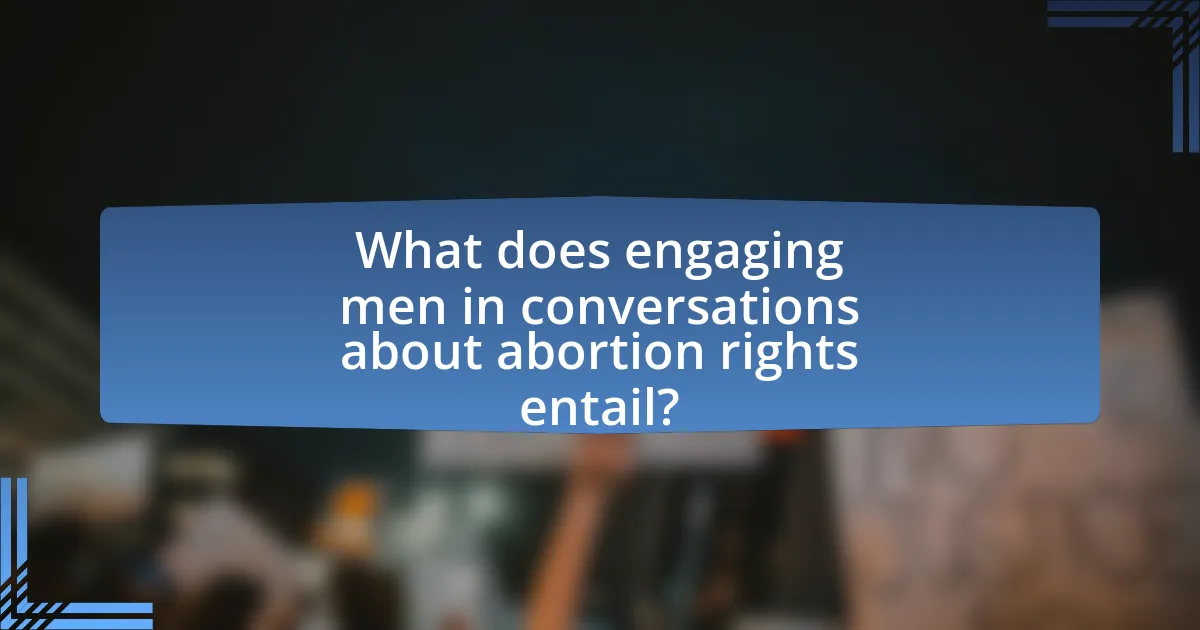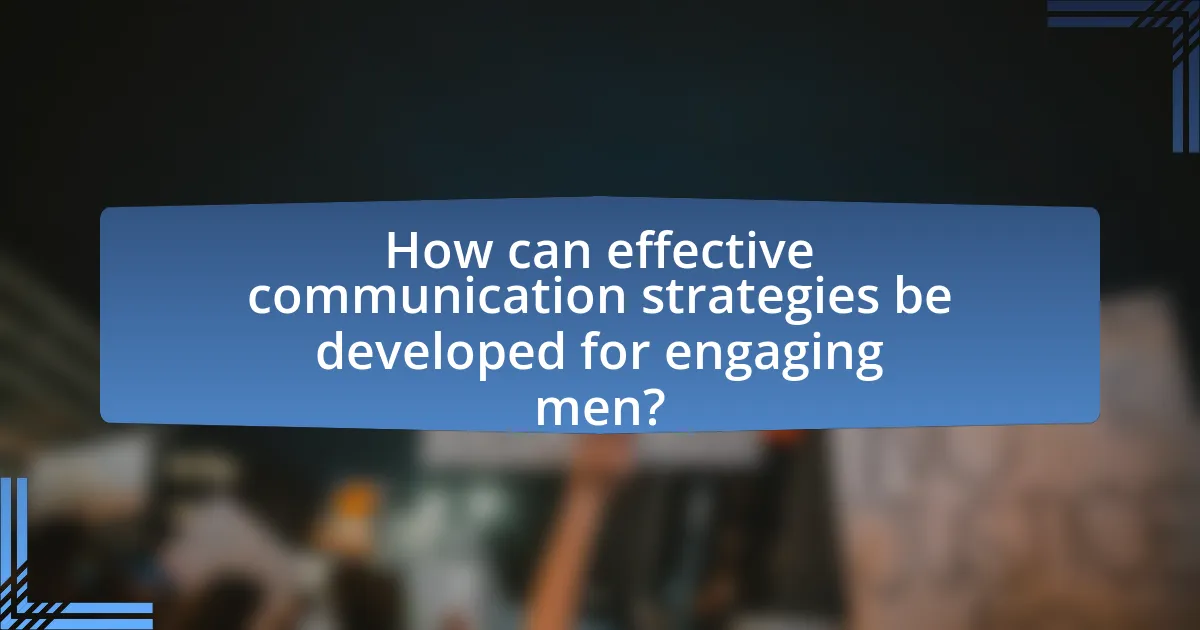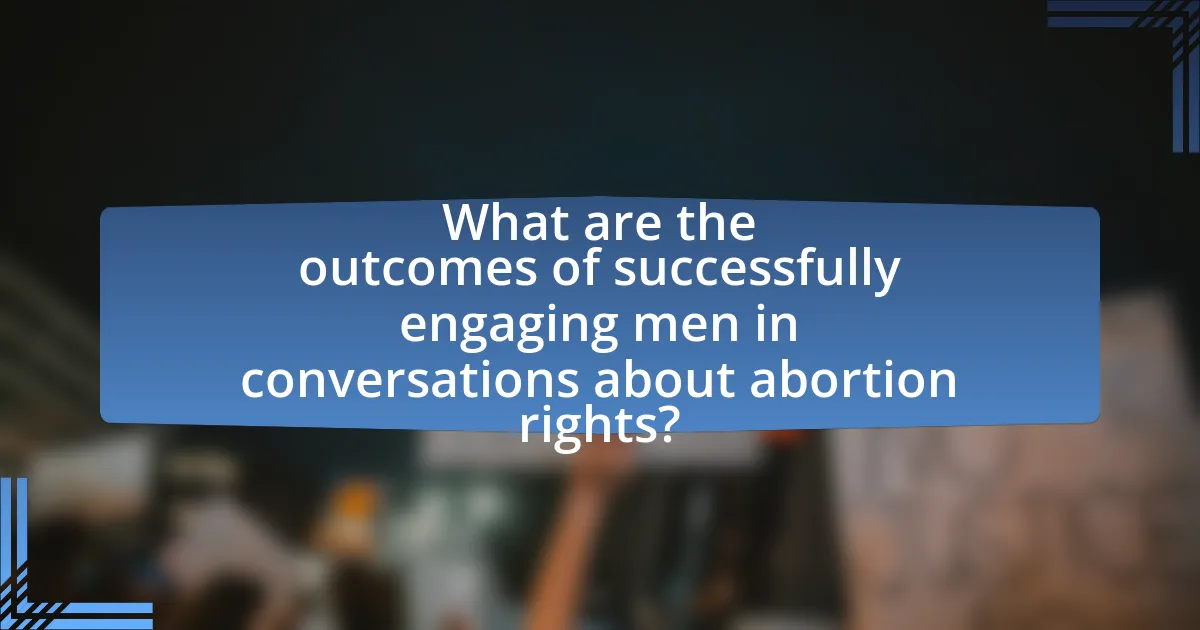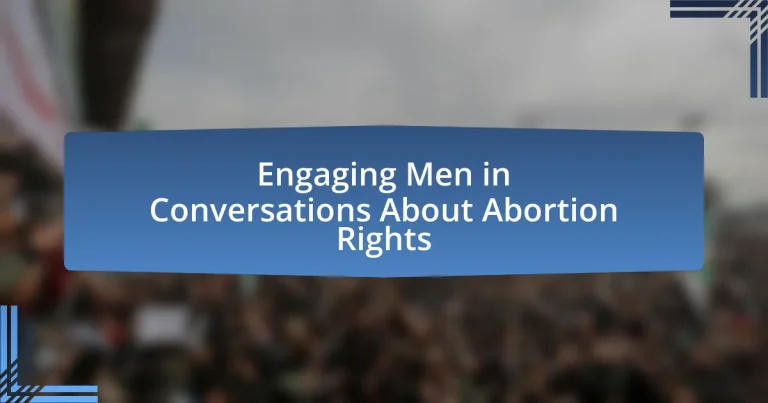Engaging men in conversations about abortion rights is essential for fostering understanding and support for women’s reproductive health. The article explores the importance of involving men in discussions about abortion, highlighting their potential role as allies in advocating for reproductive justice. It addresses the challenges men face in engaging with this topic, including societal norms and misconceptions, and outlines effective communication strategies to encourage participation. Additionally, the article emphasizes the positive impact of male involvement on public opinion and advocacy efforts, ultimately contributing to a more inclusive dialogue on abortion rights.

What does engaging men in conversations about abortion rights entail?
Engaging men in conversations about abortion rights entails fostering open dialogue that encourages men to understand the complexities of reproductive health and the implications of abortion on women’s lives. This engagement involves educating men on the legal, ethical, and social dimensions of abortion, emphasizing the importance of women’s autonomy and the impact of restrictive policies. Research indicates that men can play a crucial role in supporting reproductive rights; for instance, a study published in the journal “Perspectives on Sexual and Reproductive Health” found that men who are informed about abortion rights are more likely to advocate for women’s access to these services. By creating safe spaces for discussion, men can express their views, challenge misconceptions, and become allies in the fight for reproductive justice.
Why is it important to involve men in discussions about abortion rights?
Involving men in discussions about abortion rights is important because it fosters a more inclusive dialogue that acknowledges the shared responsibilities in reproductive health. Engaging men can lead to greater understanding and support for women’s rights, as studies show that when men are educated about reproductive issues, they are more likely to advocate for equitable policies. For instance, research published in the journal “Reproductive Health” indicates that male involvement in family planning discussions can positively influence women’s access to healthcare services. This collaborative approach not only empowers women but also encourages men to take an active role in promoting gender equality and reproductive justice.
What perspectives do men bring to the conversation on abortion rights?
Men bring diverse perspectives to the conversation on abortion rights, including views shaped by personal experiences, societal roles, and ethical considerations. Many men advocate for reproductive rights based on the belief in gender equality and the importance of bodily autonomy, recognizing that decisions about pregnancy impact both partners. Research indicates that men who engage in discussions about abortion often emphasize the need for supportive environments for women and the importance of shared responsibility in reproductive choices. Furthermore, studies show that men’s involvement can lead to more comprehensive understanding and advocacy for policies that support reproductive health, as evidenced by initiatives like the “Men for Choice” movement, which highlights male allies in the fight for abortion rights.
How can men’s involvement influence public opinion on abortion rights?
Men’s involvement can significantly influence public opinion on abortion rights by providing diverse perspectives that challenge traditional narratives. When men actively participate in discussions about abortion, they can help normalize the conversation, reduce stigma, and foster empathy towards women’s experiences. Research indicates that male allies can effectively advocate for reproductive rights, as seen in campaigns where men speak out against restrictive laws, thereby swaying public sentiment. For instance, a study published in the journal “Gender & Society” highlights that men who engage in pro-choice activism can shift perceptions among their peers, leading to increased support for abortion rights.
What challenges exist in engaging men on this topic?
Engaging men in conversations about abortion rights faces several challenges, primarily rooted in societal norms and perceptions. Many men may feel that abortion is primarily a women’s issue, leading to disengagement from discussions. Additionally, cultural stigmas surrounding masculinity often discourage men from expressing their opinions on reproductive rights, as they may fear being judged or perceived as unsupportive. Research indicates that men often lack comprehensive knowledge about abortion and its implications, which can hinder meaningful dialogue. Furthermore, the emotional aspects of the topic can create discomfort, making men hesitant to participate in conversations that require vulnerability and empathy. These factors collectively contribute to the difficulty in fostering open and constructive discussions among men regarding abortion rights.
What societal norms affect men’s willingness to discuss abortion rights?
Societal norms significantly influence men’s willingness to discuss abortion rights, primarily through traditional gender roles and expectations surrounding masculinity. Men are often socialized to prioritize stoicism and emotional restraint, which can lead to discomfort in discussing sensitive topics like abortion. Additionally, societal expectations may discourage men from engaging in conversations perceived as women’s issues, reinforcing a belief that such discussions are outside their domain. Research indicates that men who adhere strongly to traditional masculine norms are less likely to express opinions on reproductive rights, as seen in studies published in journals like “Men and Masculinities,” which highlight the impact of masculinity on social engagement.
How do misconceptions about abortion impact men’s engagement?
Misconceptions about abortion significantly hinder men’s engagement in discussions surrounding abortion rights. These misconceptions often lead men to believe that abortion is solely a women’s issue, resulting in their disengagement from conversations that affect their partners, families, and communities. Research indicates that when men perceive abortion as a topic that does not concern them, they are less likely to participate in advocacy or support efforts, which can perpetuate stigma and misinformation. For instance, a study published in the journal “Men and Masculinities” found that men who held misconceptions about abortion were less likely to express support for reproductive rights, demonstrating a direct correlation between misunderstanding and lack of involvement.

How can effective communication strategies be developed for engaging men?
Effective communication strategies for engaging men can be developed by understanding their perspectives and utilizing relatable messaging. Research indicates that men are more likely to engage in conversations about sensitive topics when the communication is framed in a way that resonates with their values and experiences. For instance, using statistics that highlight men’s roles in family planning and the impact of abortion rights on their partners can create a personal connection. Additionally, employing inclusive language and fostering an environment of open dialogue encourages men to share their thoughts and feelings, making them more likely to participate in discussions about abortion rights.
What approaches can be used to initiate conversations about abortion rights with men?
To initiate conversations about abortion rights with men, one effective approach is to create a safe and respectful environment for dialogue. This can be achieved by using open-ended questions that encourage personal reflection, such as asking about their views on reproductive rights and the implications for women’s health. Engaging men through relatable scenarios or current events can also facilitate discussion, as it allows them to connect emotionally and intellectually with the topic. Research indicates that men are more likely to engage in discussions when they feel their opinions are valued and when the conversation is framed around shared values, such as family and health. For instance, a study published in the Journal of Men’s Studies highlights that men often respond positively when discussions about abortion rights are linked to broader issues of gender equality and social justice.
How can personal stories be utilized to foster dialogue?
Personal stories can be utilized to foster dialogue by creating emotional connections and relatability among participants. When individuals share their personal experiences related to abortion rights, it humanizes the issue, allowing others to see different perspectives and understand the complexities involved. Research indicates that narratives can significantly influence attitudes and promote empathy, as demonstrated in studies like “The Power of Storytelling in Health Communication” by Green and Brock, which highlights how personal stories can change perceptions and encourage open discussions. By facilitating a safe space for sharing, personal stories encourage participants to engage in meaningful conversations, ultimately leading to greater understanding and collaboration on sensitive topics like abortion rights.
What role does active listening play in these conversations?
Active listening plays a crucial role in conversations about abortion rights by fostering understanding and empathy between participants. This communication technique allows individuals to fully comprehend the perspectives and emotions of others, which is essential in sensitive discussions like abortion. Research indicates that active listening enhances trust and rapport, making it easier for men to engage meaningfully in conversations about abortion rights. For instance, a study published in the Journal of Communication found that active listening significantly improves interpersonal relationships and encourages open dialogue, which is vital for discussing complex topics such as reproductive rights.
How can educational resources be tailored to engage men?
Educational resources can be tailored to engage men by incorporating relatable content, addressing specific concerns, and utilizing diverse formats. Research indicates that men often respond better to materials that reflect their experiences and values, such as case studies or testimonials from male figures. Additionally, focusing on the implications of abortion rights on family dynamics and societal responsibilities can resonate with male audiences. A study published in the Journal of Men’s Studies highlights that men are more likely to engage with educational content when it includes interactive elements, such as discussions or workshops, which foster a sense of community and shared responsibility.
What types of materials are most effective in educating men about abortion rights?
Educational materials that are most effective in educating men about abortion rights include comprehensive guides, infographics, and interactive workshops. Comprehensive guides provide detailed information on legal rights, medical facts, and ethical considerations surrounding abortion, which helps men understand the complexities of the issue. Infographics visually present statistics and key points, making the information more accessible and easier to digest. Interactive workshops facilitate discussions and allow men to engage with experts and peers, fostering a deeper understanding of the topic. Research indicates that men who participate in such educational formats are more likely to support reproductive rights and engage in informed conversations about abortion.
How can workshops and seminars be structured to encourage participation?
Workshops and seminars can be structured to encourage participation by incorporating interactive elements, such as group discussions, role-playing, and Q&A sessions. These methods actively engage attendees, fostering a sense of involvement and ownership in the conversation. Research indicates that interactive formats increase retention and satisfaction; for instance, a study published in the Journal of Educational Psychology found that participants in interactive workshops reported a 30% higher engagement level compared to traditional lecture formats. Additionally, providing a safe and respectful environment for sharing diverse perspectives can further enhance participation, as it encourages open dialogue and reduces apprehension among attendees.

What are the outcomes of successfully engaging men in conversations about abortion rights?
Successfully engaging men in conversations about abortion rights leads to increased awareness, support for reproductive rights, and a more balanced dialogue on the issue. When men participate in these discussions, they often gain a deeper understanding of the complexities surrounding abortion, which can result in advocacy for policies that protect reproductive health. Research indicates that men who are informed about abortion rights are more likely to support women’s autonomy and contribute positively to conversations within their communities. For instance, a study published in the Journal of Men’s Studies found that men who engage in discussions about reproductive rights are more likely to challenge stigmas and promote gender equality, demonstrating the significant impact of their involvement.
How does increased male engagement impact advocacy efforts?
Increased male engagement significantly enhances advocacy efforts by broadening the support base and fostering diverse perspectives. When men actively participate in discussions about abortion rights, they contribute to a more inclusive dialogue that can challenge stereotypes and promote understanding. Research indicates that male allies can influence public opinion and policy by leveraging their social networks, thereby amplifying the reach and impact of advocacy campaigns. For instance, a study published in the Journal of Social Issues found that male involvement in gender equality initiatives led to increased awareness and support for women’s rights issues, demonstrating the positive correlation between male engagement and effective advocacy outcomes.
What changes can be observed in community attitudes towards abortion rights?
Community attitudes towards abortion rights have shifted towards greater support for reproductive rights in recent years. Surveys indicate that a significant portion of the population now believes in the importance of access to safe and legal abortion, with a 2021 Gallup poll showing that 58% of Americans identify as pro-choice, an increase from 50% in 2000. This change reflects broader societal trends, including increased advocacy for women’s rights and reproductive health, as well as heightened awareness of the implications of restrictive abortion laws. Additionally, younger generations tend to hold more progressive views on abortion, contributing to the evolving landscape of public opinion.
How can male allies support women’s rights in the context of abortion?
Male allies can support women’s rights in the context of abortion by actively advocating for reproductive rights and amplifying women’s voices in discussions about abortion. This includes educating themselves on the complexities of abortion issues, challenging anti-abortion rhetoric, and participating in campaigns that promote access to safe and legal abortion services. Research indicates that men who engage in conversations about reproductive rights can help reduce stigma and foster a more supportive environment for women’s choices, as seen in studies highlighting the positive impact of male involvement in gender equality initiatives.
What practical tips can enhance conversations about abortion rights with men?
To enhance conversations about abortion rights with men, focus on creating a respectful and open dialogue. Start by actively listening to their perspectives, which fosters mutual understanding and respect. Use factual information, such as statistics showing that 1 in 4 women will have an abortion by age 45, to provide context and support your points. Encourage empathy by sharing personal stories or testimonials that highlight the complexities of abortion decisions. Additionally, frame the discussion around shared values, such as health care access and women’s rights, to find common ground. Engaging in these ways can lead to more productive and meaningful conversations.
How can one create a safe space for open dialogue?
To create a safe space for open dialogue, one must establish clear ground rules that promote respect and confidentiality. This involves actively listening to all participants, validating their feelings, and ensuring that everyone has an equal opportunity to speak without interruption. Research indicates that environments where individuals feel psychologically safe lead to more honest and productive conversations (Edmondson, 1999, Harvard Business Review). By fostering an atmosphere of trust and openness, participants are more likely to engage in meaningful discussions about sensitive topics, such as abortion rights.
What strategies can help address resistance or discomfort during discussions?
To address resistance or discomfort during discussions about abortion rights, employing active listening and creating a safe space for dialogue are effective strategies. Active listening involves fully concentrating on the speaker, acknowledging their feelings, and responding thoughtfully, which can help reduce defensiveness and foster understanding. Creating a safe space entails establishing ground rules for respectful communication, ensuring that all participants feel valued and heard, which can mitigate discomfort and encourage open expression of differing viewpoints. Research indicates that environments promoting psychological safety lead to more productive discussions, as participants are more likely to share their thoughts without fear of judgment.


